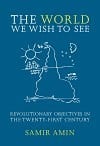Global

A breakthrough in the development of socialist thought, The Challenge and Burden of Historical Time is both a companion volume to Mészáros’s seminal Beyond Capital and a major theoretical contribution in its own right. Mészáros, one of the foremost Marxist thinkers of our age, focuses on the tyranny of capital’s time imperative and the necessity of a new socialist time accountancy, and provides a strong refutation of the popular view that there is no alternative to the current neoliberal order. | more…

The World We Wish to See presents a sweeping view of twentieth-century political history and a stirring appeal to take political organization seriously. Amin offers provocative analysis of contemporary resistance to neoliberalism,while boldly calling for a new global movement, “an internationalism of peoples,” to challenge the current order and fashion a better world. | more…
Although private corporations under capitalism have always been heavily involved in promoting war, the direct role played by the private sector in the prosecution of war has traditionally been quite limited, falling well short of the supply of combat troops. There are signs that this may now be changing. The decade and a half since the end of the Cold War has seen the rapid proliferation of private military firms, hundreds of which are now engaged in combat and combat-support operations in Iraq and throughout the globe. Some of these firms are subsidiaries of much larger multinational corporations. The private soldiers employed in this industry are mercenaries, but not of the traditional kind. They are employees of corporations that have boards of directors, are publicly traded, participate in the open market, carry out mergers, hire and fire in accordance with market criteria—and above all are not directly responsible to any public authority. In other words, these corporations and their employees are fully integrated with capitalist enterprise as a whole. This phenomenon has recently been dubbed “the corporatization of the military” by Peter Singer, a Brookings Institution analyst and author of Corporate Warriors (2003) | more…
These are difficult times for workers. In the wealthy countries of capitalism’s center, labor is struggling to maintain existing wages and benefits against a combined assault by corporations and governments, while conditions of workers in the periphery are even more difficult. The widespread acceptance and adoption of capital’s agenda—”free trade,” “free markets,” greater “flexibility” regarding labor, and reduced social welfare assistance—has led to one group of real winners. Transnational corporations (and their owners and top managers) now have more freedom to produce where labor and other costs are cheap, have their patents protected, and move capital in and out of countries at will. Many workers, unfortunately, are finding that their situation has become more tenuous. | more…
We were enormously pleased to publish in the November 2002 issue of MR Richard Lewontin and Richard Levins’s “Stephen Jay Gould: What Does it Mean to Be a Radical?” commemorating the life of their great Harvard colleague who had died earlier that year. Gould, as Lewontin and Levins explained, was, in addition to being one of the foremost evolutionary biologists and paleontologists of his time, “by far, the most widely known and influential expositor of science who has ever written for a lay public.” Their article has recently been reprinted as the concluding essay in Oliver Sacks, ed., The Best American Science Writing, 2003. This important series, with Jesse Cohen as the series editor, is published each year by HarperCollins, each time under the editorship of a different guest editor—in this instance Sacks, author of The Man Who Mistook his Wife for a Hat and many other works. In preparing this year’s volume Sacks chose to dedicate the book to Stephen Jay Gould, who he sees as the exemplary figure in modern science writing | more…
This year marks the 10th anniversary of the death of Ralph Miliband, who was one of the leading Marxist political theorists of the second half of the 20th century. His works, Parliamentary Socialism (1961), The State in Capitalist Society (1969), and Marxism and Politics (1977) are classics of socialist political analysis. This year is also the 40th anniversary of The Socialist Register, an annual journal that Miliband cofounded and coedited for 30 years | more…

Longshoremen stand at the nexus of the global economy, handling nearly every cargo container that enters or leaves any country. Even in the face of the “containerization” of cargo in the 70s and 80s, a development that decimated longshore unions, they have managed to win contracts that provide exceptional benefits and high wages. | more…
Historical materialists are not prophets; they do not predict the future course of history. They are concerned rather with the present as history. This fundamental principle of Marxist thought is called to mind by our reencounter recently with a common misinterpretation of Lenin’s Imperialism. In his new book, The New Imperialism, David Harvey writes (p. 127): “I therefore think Arendt is…correct to interpret the imperialism that emerged at the end of the nineteenth century as the ‘first stage in political rule of the bourgeoisie rather than the last stage of capitalism’ as Lenin depicted it.” (See also Harvey’s piece “The ‘New’ Imperialism” in the Socialist Register, 2004, p. 69.) | more…

How do we understand the world? While some look to the heavens for intelligent design, others argue that it is determined by information encoded in DNA. Science serves as an important activity for uncovering the processes and operations of nature, but it is also immersed in a social context where ideology influences the questions we ask and how we approach the material world. Biology Under the Influence breaks from the confines of determinism, offering a dialectical analysis for comprehending a dynamic social and natural world. | more…
Samir Amin’s “World Poverty, Pauperization, and Capital Accumulation,” the Review of the Month in this issue of MR, addresses the growing phenomena of landlessness and pauperization among rural populations in the periphery. He reminds us that half of the people in the world are peasants, a group largely unseen by liberals and radicals. The dispossession of the peasantry throughout the third world represents one of the central problems of our time—for reasons of straightforward humanity. Amin points out that the worsening position of the peasantry, their forced migration to cities, and the growth of hunger among the poor cannot be adequately dealt with by treating these problems as mere aberrations of the system. Mounting occasional “anti-poverty” programs or “humanitarian” assistance or even projects to enhance farm productivity offer no real long-term solutions. In fact, the inherent contradictions in the third world are such that even increases in the productivity of peasants so that more food is producedin the absence of employment opportunities for rural labor that is no longer needed in agriculture—can seriously worsen the problem of displacement and hunger! The enormous humanitarian problem that Amin describes is rather a result of the way capitalism works on a world scale. The clear lesson to be drawn from his article is that the anti-globalization struggle needs to be aimed at the real problem—the capitalist system | more…

The dangers and immense suffering caused by all attempts at solving deep-seated social problems by militaristic interventions, on any scale, are obvious enough. If, however, we look more closely at the historical trend of militaristic adventures, it becomes frighteningly clear that they show an ever greater intensification and an ever-increasing scale, from local confrontations to two horrendous world wars in the twentieth century, and to the potential annihilation of humankind when we reach our own time. | more…
On May 3 MR will be hosting its “Imperialism Today” conference in Burlington, Vermont in honor of Harry Magdoff’s ninetieth birthday. Harry officially became an editor of Monthly Review thirty-four years ago this month in May 1969, when he joined Paul Sweezy as co-editor following the death of Leo Huberman in 1968. In the period since then he has edited 408 monthly issues of the magazine (counting the summer issues as double issues). MR would not be what it is today without Harry’s imprint on each and every one of these issues. During the last thirty-six of these we have shared this role with Harry. What this has driven home to us is Harry’s exceptional warmth as a human being, his brilliance as a political-economic analyst, his unlimited patience as a teacher and writer determined to communicate in plain terms, his openness to new radical vistas, and above all his personal integrity and courage, which, as with Marx, allows him to elude the traps of ideology and dispense with all fashions, acting according to the motto: “Go on your way, and let the people talk” (a variation on a line from Dante used by Marx at the end of the preface to the first edition of Capital) | more…




